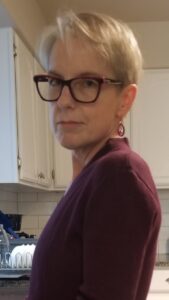Poets of the Dark: Interview with Saytchyn Maddux-Creech

Saytchyn Maddux-Creech survived the MFA program at Colorado State University with their love of all things creepy intact. Saytchyn’s stories and poems can be found in numerous journals, many under the name Sandra Maddux-Creech. They live in northern Colorado with their partner and several beloved familiars.
What sparked your interest in horror poetry? Was there a particular event or work that inspired you to delve into the darker side of poetry?
In kindergarten, I fell in love with a folk song our teacher taught us about a skeletal ghost. The song was called, “The Ghost of John.” I couldn’t write much more than my name yet, but I began making up spooky rhymes to creep out my friends. That was probably the beginning.
Can you describe your creative process when writing horror poetry? Do you have any rituals or techniques that help you tap into your darkest fears and bring them to life on the page?
Words might pop into my head or sometimes in dreams. Often, I don’t know what I’m trying to say until I’ve pushed these words around a little. I wouldn’t classify all my poetry as horror, but the dark ones are often written at night or when it’s raining or when I’m burning candles. Most especially when I’m missing people who have died.
How do you balance the need to be evocative and disturbing with the constraints of poetic structure and form? Are there any particular strategies you use to create tension and build suspense in your horror poems?
Poetic form feels like it was made for the evocative and the disturbing. The most haunting, troubling short stories read like poetry to me. Clive Barker’s “The Inhuman Condition” comes to mind. As far as strategies to create tension, I’m not aware of any when I write poetry, but if I’m writing about something that doesn’t make me feel anything, I know the reader probably also won’t feel anything, so I need to start over or scrap it.
Who are some of your favorite horror poetry inspirations? Are there any authors or poets whose work you admire and draw inspiration from when crafting your own dark verse?
I adore Poe. Louise Erdrich. Dorothea Tanning. Though are they considered horror? I don’t know. I love it when a poem makes me catch my breath with both its language and its content.
Finally, what advice would you give to aspiring horror poets who want to explore the genre? Are there any particular challenges or pitfalls they should be aware of, and how can they overcome them to create truly terrifying poetry?
I guess I don’t try to write terrifying poetry, although it often goes there. When you really push at your own boundaries, it’s often terrifying. I’d say read every poem you can, and when you write, go where you’re afraid to go.



